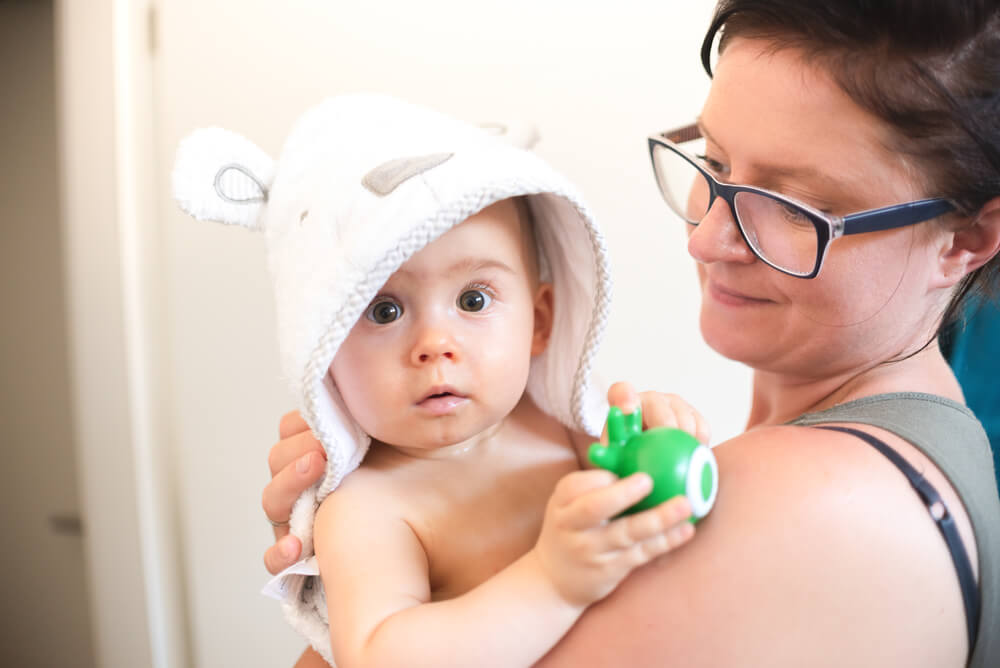Help! My Baby Won’t Sleep. What Should I Do?

Your baby is born and the first 2 weeks are a dream. Baby sleeps and is generally easy. Why did people say this is so hard? The thig is – harmony doesn’t last long. All of a sudden it is as if your baby realizes that they have been born and everything changes. What now? Why won’t my baby sleep?
This is usually the start of what can be a very long road to good sleep. The good news is that there is hope. Understanding what to expect from your baby when it comes to sleep, as well as the reasons why they baby fights sleep is the starting point for better sleeping patterns.
Contents:
- How Much Should My Baby Sleep?
- Reasons Your Baby Won’t Sleep (and How To Cope With Them)
- Things To Try If Your Baby Will Not Sleep: Relief For Tired Parents
How Much Should My Baby Sleep?

Prostock-studio/Shutterstock.com
Having realistic and appropriate expectations when it comes to your baby’s sleeping patterns could help you get some perspective. Here is a chart to help guide you.
| Age | Total hours of sleep | Naps |
| 0-2 weeks | Most of the day except when feeding | Most of the day |
| 2-6 weeks | 18-20 hours | Many naps a day |
| 6-12 weeks | 16-18 hours | 3 naps a day |
| 3-6 months | 14-18 hours | 3 naps a day |
| 6-12 months | 12-16 hours | 2 naps a day |
| 12-24 months | 12-16 hours | Drop 1 nap, only has 1 nap a day |
| 3-5 years | 12 hours | Drops nap, no longer needs to nap during the day |
⠀
Reasons Your Baby Won’t Sleep (and How To Cope With Them)

Prostock-studio/Shutterstock.com
There are many factors at play that can be to blame for your baby’s lack of sleep. Now that you know what you can expect in terms of good sleeping habits, let’s take you through the many reasons your baby might not be sleeping well.
1. Mixing up day and night
This is most common in newborns and very young babies. They have no way to know what time it is yet and it often happens that their day and night have been switched around. Resulting in a peaceful day of sleeping and a wakeful night.
To combat and correct this you will need to ensure that the room is dark and quiet at night and refrain from too much engagement when the baby wakes at night. This is not playtime.
During the day make sure that the room is light, get some sunshine, and wake the baby often so that their biological clock can sync with day and night.
2. Startle reflex
This is also common in young babies. A baby is born with a bunch of reflexes intact. The startle reflex often wakes them up as if they get a fright. This is why most babies sleep better when swaddled or in a sleeping sack which keeps their arms closer and tight to their bodies. This stops them from waking up from their startle reflex while they still need sleep.
3. Reflux
Many babies struggle with reflux as the sphincter muscle is not yet fully mature. This allows some of the stomach contents to push up into the esophagus. This especially happens when in a lying position.
If this is the case with your baby, try to feed your kid in a more upright position and keep them upright for 30 minutes after a feed. When sleeping use an incline sleep positioner which helps so that your baby doesn’t lie down flat but rather at a slight angle.
4. Overstimulated

Prostock-studio/Shutterstock.com
To your baby everything is new and exciting. There is a whole new world outside of the womb. This also means that they can get overstimulated quite quickly.
Lights, noises, and people can easily overstimulate your baby. The difficulty is that they cannot self-regulate yet, or tell you when they are starting to feel overwhelmed. By the time they are overstimulated they can’t regulate and calm themselves down (and sometimes neither can you).
Before you know it you are sitting with an overstimulated, fussy baby, who can’t fall asleep or stay asleep.
5. Overtired
It is important to understand that healty sleeping habits in the day sleep sets the stage for better restful sleep at nght. This means that helping your baby sleep well during his naps in the day sets you up for good sleep at night too. One of the big mistakes parents make is thinking that a tired baby that didn’t sleep enough during the day will sleep well at night, when the opposite is actually true. If baby is overtired, their little brain struggles to switch off which makes for bad sleep at night and a grumpy baby.
It is very similar to when you as an adult have had a very busy day and when you eventually climb into bed you can’t get your mind to switch off as everything you have been working on, thinking about and worrying about is running through your mind. This is one of the many reasons baby fights sleep.
6. Illness
One of the most obvious reasons for not sleeping is when your child is ill. If your child is sick your routine usually goes out the window. Don’t worry too much, the most important part now is to nurse your child back to health. You can get back into your sleep routine as soon as baby is better.
7. Teething pain

Prostock-studio/Shutterstock.com
Teething pain can often cause bad sleep. The best course of action would be to help baby by giving the relevant pain medication as approved by your health care professional.
8. Developmental cusp
Whenever a baby is about to master a new developmental milestone, especially the big ones like crawling and walking, this often influences their sleep. You will often find that they roll and move around in their sleep during this time and their little brains are processing the movements and development that they are approaching.
Don’t despair, things will go back to normal as soon as they have figured out the new milestone.
9. Sleep regression
Sleep regression refers to when your baby, who used to sleep well, suddenly has a big change in their sleeping pattern for no apparent reason. This mostly happens at around 4 months, 6 months, 8-10 months and at 12 months, but can happen at any time. The good news is that this often lasts a week or two.
10. After being ill, getting back into the routine
After being sick and out of their usual routine, babies often struggle to get back into it. Just be consistent with implementing the routine that has worked for you before and soon baby will get back into it too.
11. Routine changes

Prostock-studio/Shutterstock.com
Adapting to a new routine can be challenging. If you have had to change your usual bedtime routine, whether it is because you are on vacation, your circumstances have changed or the old routine wasn’t working so well, baby can take a while to adapt.
Again, just be consistent and baby will eventually get used to the new routine.
12. Lack of routine
Babies thrive on routine. This does not have to be a strict routine with no flexibility. Routine is the best way for a baby to understand what is to come. Your baby will know what time of day it is from the cues that he receives from you. Having a good bedtime routine helps set them up for good sleep.
This can be as simple as eating, bathing, or reading a story. It does not have to happen at exactly the same time every day but having a routine in place as a sleep association will help your child fall asleep and stay asleep.
13. Not being active enough
Sometimes, especially for older babies and toddlers, kids are too passive during the day. If they did not have enough movement and vestibular activity during the day, they might simply not be tired enough to sleep properly at night.
Make sure that your child plays and moves a lot during the day for both healthy development and good sleep.
14. Hunger
Baby might be waking simply because they are hungry. This is very common in young baby’s who still need to feed every 4 hours or so.
For older babies, adding some more protein to supper and half a banana before bedtime, could help to give instant results. This is because protein makes us feel fuller for longer, the same with a banana. Adding this before bedtime helps baby sleep longer as they don’t get hungry again as quickly.
15. Sleep environment
The environment that your baby sleeps in should be conducive to sleep. So, no toys or stimulating activities should be around or in the crib. The room should be calm and quiet when it is sleep time.
16. Sleep cycles
A baby’s sleep cycles are typically 40-50 minutes long. This is often the reason why you will find that baby sleeps for 45 minutes and then wakes up. The biggest reason for this is that baby can’t go back to sleep by themselves. Don’t worry we can help you with that too, check out or answer below under sleep associations.
Things To Try If Your Baby Will Not Sleep: Relief For Tired Parents

Prostock-studio/Shutterstock.com
Not all is lost. There are a few things you can do to help your baby sleep well.
1. Sleep associations
One of the biggest traps we as parents fall into is that we do not teach our kids to fall asleep independently. That doesn’t mean that we should leave babies to cry by themselves until they give up and go to sleep. Not at all! We need to help them learn to fall asleep in a sustainable way.
So instead of rocking, drinking, sucking or lying in your arms every time going to sleep, we need to give them a sleep association that they can use at night when they wake from their natural sleep cycles, that does not involve us having to get up every time.
The concept is easy, but it can be tricky to instill if baby is already dependent on you for sleep. Basically, all you need to do is give baby something like a teddy or blanket to use as a sleep association. This is not a play time item, but a sleep time item.
When it is time to sleep, give baby the item. You can introduce it when holding or feeding baby, if that is already the association made. You can introduce it by giving your baby the item while you hold or feed themm. You can even put the item, such as a blanket between you two. This will then eventually become part of their sleep association. Then, when baby is sleepy, but not yet fully asleep, put them down with the item in hand.
As soon as they use this item and their sleep association instead of you, they will fall back asleep between sleep cycles without you too.
2. Bedtime routine
Establish a bedtime routine so that your baby has time to calm down and switch off after a long day. Going to bed after some calming time will help baby sleep better. A routine is also a way for your baby to know that it is in fact bedtime now.
3. Be consistent
Putting baby to bed in a similar fashion every time helps your baby understand what is expected and that they now have the opportunity to sleep. This is true for both nap times and night sleep time.
4. White noise
White noise can often be helpful when it comes to sleep. Inside the womb baby was constantly surrounded with white noise. In the real world it sounds a lot different. There are many apps that can be downloaded for this purpose. You can also purchase a white noise machine.
5. Bath time
Having bath time close to bedtime helps baby relax and switch off after a busy day. Adding some Epsom salts to the bath and even a drop or 2 of lavender oil can also help baby go to sleep easier after his bath.
After their bath give baby a little massage when moisturizing. This all helps calm the sensory system and brain which leads to better sleep.
6. Essential oils
Lavender is known for its calming properties. Not only can it be added to the bath water, you can also add a few drops to a diffuser in baby’s room.
The Lowdown On Getting Baby Down To Sleep

Prostock-studio/Shutterstock.com
The good news is that you will sleep again long before your child turns 18. With some patience, consistency, good sleep associations and habit both you and baby can get some much-needed sleep.
Have you tried any of these? What has worked for your family? Share and let us know.
Проверьте электронный ящик



















